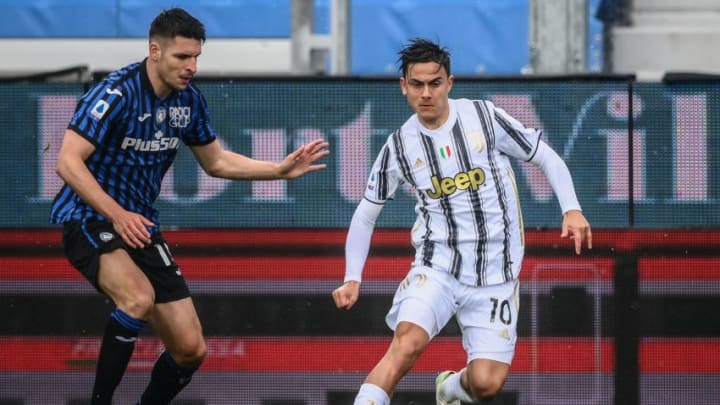On a day when the power-hungry owners of Europe’s elite opted to drop the biggest bombshell in, perhaps, the sport’s history, Juventus’ 1-0 defeat in Bergamo to Atalanta seems nothing short of trivial, especially in the context of the top-four race in Serie A.
But we’re going to delve deep into the Bianconeri’s defeat anyway, with Ruslan Malinovskyi’s deflected effort three minutes from time securing a famous triumph for La Dea.
Here are three takeaways from Sunday’s clash.
Paulo Dybala’s return
After being eased back into Andrea Pirlo’s plans by coming on as a substitute in the recent victories over Napoli and Genoa, Paulo Dybala was granted his first Juventus start since January in Cristiano Ronaldo’s absence.
So, how did he get on?
Well, it was a bright opening, with the free-roaming Argentine a protagonist in Juve’s quick start to proceedings through his capacity to combine and rotate expertly with those around him. Atalanta’s man-orientation meant he was closely monitored by Berat Djimsiti and Marten De Roon throughout, with Dybala’s craft ensuring he outfoxed the diligent Dutchman on more than one occasion in the opening period to kickstart swift Bianconeri transitions. The prime example of that occurred in the 38th minute when Dybala spun away from De Roon after being fed by a driven Giorgio Chiellini pass before sliding through Weston McKennie for a good chance.
However, the overwhelming intensity of the contest soon caught up with La Joya as his influence waned considerably after the restart. De Roon started to have more success one-v-one, with Atalanta’s work out of possession almost suffocating Dybala at times. His substitution after 68 minutes was no surprise.
Overall, there was reason for optimism regarding La Joya, who finished the contest with a joint-team high of three key passes.
Concerns over Chiesa
A horrible afternoon for Juventus began once superstar Federico Chiesa pulled up with an apparent hamstring injury after attempting to run in behind the Atalanta defence midway through the second half.
Chiesa’s influence on proceedings was limited despite Alex Sandro’s role as an inverted full-back helping the Italian isolate himself one-v-one against the sturdy Joakim Maehle down the left flank. He just didn’t get much of the ball, making zero dribbles and completing just 20 passes during his 58 minutes of action.
Nevertheless, Chiesa’s uncharacteristically quiet outing will be the least of Pirlo’s worries ahead of the ‘run-in’. The winger underwent tests on Monday morning to decipher the severity of his injury but, for now, we’re in the dark as to how long he’ll be out of action.
I suspect it’ll be a matter of weeks and he’s already been ruled out of the upcoming clash with Parma on Wednesday.
Back to the drawing board
It appeared that Pirlo had learned his lesson in the recent triumphs over Napoli and Genoa, with Il Maestro overseeing a Juve attack entrenched in fluidity and variety.
Against Atalanta, however, the dreaded asymmetry returned.
With Juan Cuadrado functioning as the auxiliary right-back, McKennie drifting infield from the right to operate between the lines and Chiesa holding the width on the left flank ahead of the conservatively positioned Alex Sandro, the structure which facilitated disconnect and staticity reared its ugly head once again in Bergamo.
There were moments of incision and precision, sure, but, overall, this was a poor Juve performance in attack. Atalanta’s man-oriented press ensured the Bianconeri’s midfield was nullified in the build-up phase, while the inability of the forwards to simply make the ball stick when the direct option was favoured allowed the hosts to control proceedings for large swathes.
The concerted effort made by Pirlo, meanwhile, to prevent Gasperini’s ingenious wide overloads and rotations from overwhelming the Bianconeri also inhibited the visitors’ potency on the break. Wide players were often forced to drop deep into their own half to match Atalanta numerically, with Dybala occasionally dropping in, too. Juve had success from a defensive perspective, but their efforts in this phase isolated Alvaro Morata once possession was regained.
Overall, it’s back to square one for Pirlo, whose in-game management was also questionable. The defeat leaves the Bianconeri in fourth and in a dogfight with five clubs for three spots in the top-four – as if that matters anyway. The Super League is upon us.
